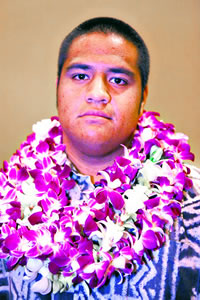Safety, Security Requires Planning
Safety is one of the pillars of a successful visitor industry. Destinations that have high crime rates, or experience just a handful of highly publicized incidents, quickly find that travelers easily go elsewhere to enjoy themselves or conduct business.
That’s why safety is one of the Hawaii visitor industry’s top priorities. On the frontlines of public and visitor safety are, of course, our local first-responders: police officers, firefighters, emergency medical technicians, life guards, and emergency management staff, complemented by representatives of federal law enforcement agencies.
But equally important to our safety are the security personnel at Hawaii’s hotels and resorts, who work closely with their government counterparts to ensure that visitors and residents alike can enjoy peace of mind.
The visitor industry’s security force is personified by Kaleo Keolanui, Safety and Security Manager for Aulani, a Disney Resort and Spa, at Ko Olina. Kaleo is the former president of the Hawaii Hotel and Visitor Industry Security Association (HHVISA), having served in that capacity for seven years until this past January, when he stepped down to concentrate on the opening of Aulani.
Kaleo, who was the Director of Safety and Security for the Hyatt Regency Waikiki Beach Resort and Spa before joining Aulani, says that hotel security is much more than just the protection of guests from potential crime. Security officers serve as fire marshals; crisis and emergency managers, as with last March’s tsunami alert; and workplace health and safety inspectors as they identify and report problems with the buildings and grounds. And as representatives of their hotels and resorts, everyday guest relations are also a major part of their diverse duties.
With such responsibilities, HHVISA plays an essential role in helping security personnel throughout the islands by keeping them abreast of pertinent issues and priorities in their profession.
HHVISA members represent hotels and resorts across the state, private security companies hired by the smaller hotels, county police and fire departments, the state and county emergency management agencies, federal law enforcement agencies like the Federal Bureau of Investigation, Drug Enforcement Administration, U.S. Marshals, and Secret Service, and local businesses that-supply security equipment and services.
“HHVISA is a forum for key communication for the overall visitor industry,” says Kaleo.
The association meets once a month, when members share information and exchange statistical data about criminal activity or learn about the latest developments in their field. The last portion of the meeting is open to general questions and concerns from members.
“As an industry group, if we can identify trends, like room break-ins or thefts, for example, we’re better prepared to prevent and respond to these problems,” he explains. The strong working relationships and collaboration that HHVISA has with county police departments enable its members to “get the word out” and help address problems promptly and effectively.
In addition to crime-related topics, the monthly meetings give members an opportunity to interact and learn from their governmental partners, such as the fire department regarding fire prevention, or to get updated on the latest health risks like viruses and public health threats from the Department of Health. Their partnerships with state and county emergency management agencies meant that hotel security officers received timely information on last year’s tsunami so they could make decisions and know when to implement their internal procedures, which included warnings to guests and, in many cases, evacuation of guests and staff to shelters.
 Preparation and being proactive are key. Kaleo points out that the visitor industry had “good plans in place,” which allowed the entire industry to respond well to the March tsunami alert last year. The emergency management agencies kept the hotels informed, and the hotels’ preparations meant everything went smoothly.
Preparation and being proactive are key. Kaleo points out that the visitor industry had “good plans in place,” which allowed the entire industry to respond well to the March tsunami alert last year. The emergency management agencies kept the hotels informed, and the hotels’ preparations meant everything went smoothly.
It’s comforting and reassuring to know that the safety and security of not only our visitors, but our most important industry, are in the hands of these outstanding professionals. These are the unsung heroes of our industry who devote themselves each day to the well-being of others.
MUFI’S VISITOR HEROES
Kapena Cummings-Gardner
Position: Security Supervisor
Location: Kaua’i Beach Resort
“Hard-working, punctual, honest, and loyal … exceptional in all areas of his profession.” Those are just a few of the superlatives used to describe Kapena Cummings-Gardner, security supervisor at the Kaua’i Beach Resort.
During a routine patrol of the resort pool last year, Kapena saw a child floating face-down in the pool. He immediately jumped in, pulled the 2-year-old out of the water, and began CPR. After a few minutes, the child began breathing on its own, and Kapena then contacted the hotel operator to ensure emergency medical personnel were summoned. The child made a full recovery thanks to Kapena’s quick thinking and calm, collected response. It’s typical of the leadership and passion he brings to his job, his coworkers, and the resort and its guests.
Kapena Cummings-Gardner volunteers for the Kaua’i Police Department’s Police Activities League as a ju-jitsu instructor and has been credited with turning around many young lives through his contributions. He’s also active in charitable activities such as Special Olympics and United Way, among others.



